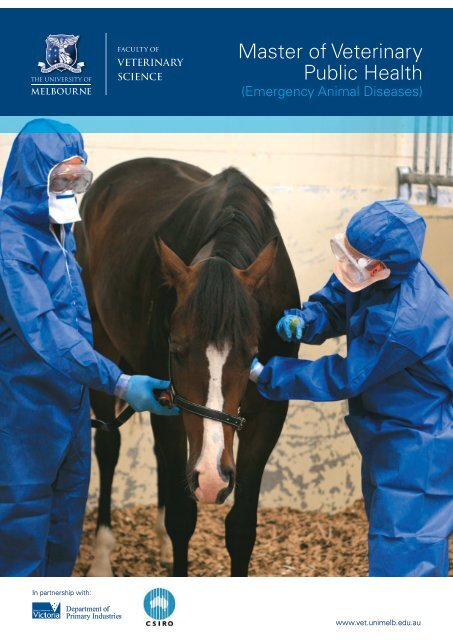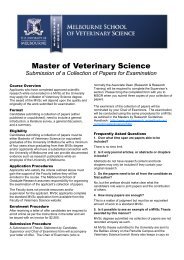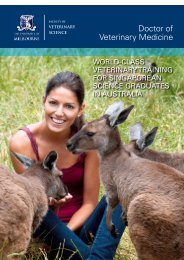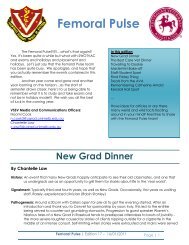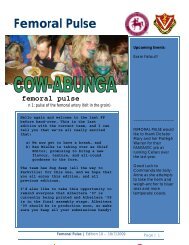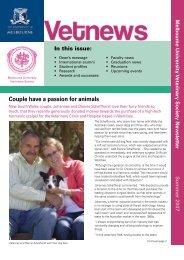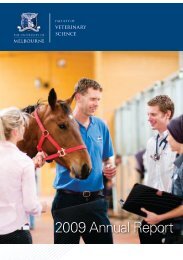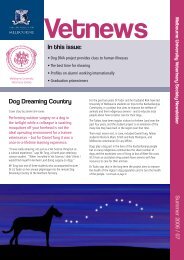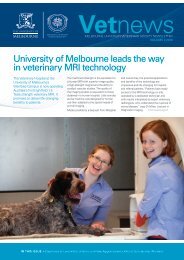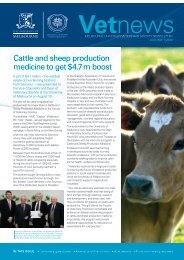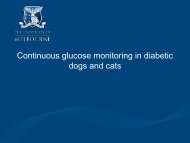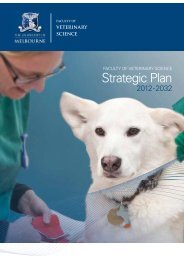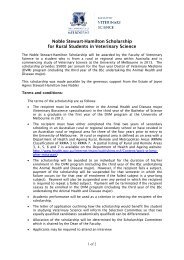Master of Veterinary Public Health - Faculty of Veterinary Science
Master of Veterinary Public Health - Faculty of Veterinary Science
Master of Veterinary Public Health - Faculty of Veterinary Science
- No tags were found...
You also want an ePaper? Increase the reach of your titles
YUMPU automatically turns print PDFs into web optimized ePapers that Google loves.
<strong>Master</strong> <strong>of</strong> <strong>Veterinary</strong><strong>Public</strong> <strong>Health</strong>(Emergency Animal Diseases)In partnership with:Department <strong>of</strong>Primary Industrieswww.vet.unimelb.edu.au
Department <strong>of</strong>Primary IndustriesProgram OverviewRecent emergency disease events, such as theemergence <strong>of</strong> Hendra, Nipah, SARS and highlypathogenic H5N1 avian influenza viruses, and the 2007outbreak <strong>of</strong> Equine Influenza in Australia, have requiredthe support <strong>of</strong> increasing numbers <strong>of</strong> appropriatelytrained veterinarians, scientists and animal healthpr<strong>of</strong>essionals.Our objective is to providean exceptional educationalexperience that will prepareveterinarians, animal scientistsand animal health workers sothey can contribute effectivelyin emergency animal diseaseresponses, both in Australia andinternationally.Of the animal diseases that posethe greatest economic, animaland public health threats, mostare considered transboundarydiseases. These infectiousdiseases are not confined bypolitical boundaries, and requiremultijurisdictional, <strong>of</strong>ten regional,approaches to achieve theircontrol and eradication fromaffected animal populations.In addition to providing deeperunderstanding <strong>of</strong> the mostimportant emergency animaldiseases, the new curriculumaddresses issues <strong>of</strong> leadershipdevelopment and riskcommunication for respondingto animal health emergencies,especially those <strong>of</strong> potentialpublic health consequence.Working pr<strong>of</strong>essionally, withcultural sensitively, and withconsideration <strong>of</strong> the needs andimpacts on all affected groupsand stakeholders is critical toensure community and industryinvolvement in such emergencyanimal disease control programs.The new <strong>Master</strong>s coursehas grown from a sharedcommitment to veterinarypublic health and emergencyanimal disease control by three<strong>of</strong> Australia’s leading researchand animal infectious diseaseresponse agencies. Thispartnership combines worldleadingexpertise in emerginginfectious disease diagnostics,with experts in veterinarypublic health education andgovernment veterinary service.The University <strong>of</strong> Melbourne willcontribute to the academicallyrigorous teaching and learningenvironment; CSIRO’s AustralianAnimal <strong>Health</strong> Laboratory(AAHL) will bring a wealth<strong>of</strong> leading-edge emergencyinfectious disease researchand policy advice; and theState Government <strong>of</strong> Victoria’sDepartment <strong>of</strong> PrimaryIndustries (DPI Victoria) willshare their ‘on the ground’experiences in the initialoutbreak detection, diagnosis,control and eradication <strong>of</strong>a range <strong>of</strong> emergency andproduction-limiting animaldiseases.We welcome veterinarians fromaround the world, includingthose from developing countries,to apply. We also stronglyencourage animal healthworkers and scientists with aninterest in disease outbreaks,the interconnectedness <strong>of</strong>animal populations, and howthe interaction <strong>of</strong> wildlifeand environmental systemsinfluence the spread <strong>of</strong> emerginginfectious diseases, to considerhow this <strong>Master</strong>s programmight suit their pr<strong>of</strong>essionaldevelopment.Program StructureThis program has been tailored to suit experiencedfull time animal health pr<strong>of</strong>essionals, providing studentswith flexibility and allowing them to be directlyresponsible for managing the time that they devoteto their studies. The first two weeks <strong>of</strong> the programis provided as a residential module with the remainder<strong>of</strong>fered as online distance education.Initially the course will only be <strong>of</strong>fered part time, with studentsexpected to complete 13 core and two elective modules to earnthe full <strong>Master</strong>s level degree in four years, whilst remaining inemployment. The approved elective modules cover a broad range <strong>of</strong>topics to allow students to tailor the course to their specific interestsand educational needs. These electives are available through theSchool <strong>of</strong> <strong>Veterinary</strong> <strong>Science</strong> and other Graduate Schools within TheUniversity <strong>of</strong> Melbourne, as well as relevant modules <strong>of</strong>fered throughother universities.Subject to student numbers and teaching resources further studyoptions may be available (subject to Academic Board approval), andprocesses are presently underway to develop two shorter embeddedcourse options: a Postgraduate Certificate in <strong>Veterinary</strong> <strong>Public</strong> <strong>Health</strong>(four modules) and a Postgraduate Diploma in <strong>Veterinary</strong> <strong>Public</strong> <strong>Health</strong>(eight modules).For any students interested in undertaking individual modules withoutinitially committing to a full degree program in veterinary public health,there will also be an opportunity to study single subjects through theUniversity <strong>of</strong> Melbourne’s Community Access Program.www.vet.unimelb.edu.au
Career OpportunitiesCareer opportunities exist for graduates inAustralia and internationally in roles dealingwith global, regional and local animal healthissues. It is expected that graduates will enjoyemployment opportunities in a diverse range <strong>of</strong>state, national and international veterinary andpublic health agencies and non-governmentalorganisations, as well as immediately joiningAustralia’s emergency animal disease responsecapacity. Subject areas <strong>of</strong>fer a combination <strong>of</strong>scientific and pr<strong>of</strong>essional skills developmentacross epidemiology, management, leadership,and outbreak risk assessment, decisionmakingand communication. The online mode<strong>of</strong> delivery, commencing with a two weekresidential at The University <strong>of</strong> Melbourne, isdesigned for students to learn from their peersand directly apply the knowledge gained toissues from their existing and future workingenvironments.Entry RequirementsThe Course SelectionCommittee will evaluate eachapplicant’s ability to pursuethe course successfully usingthe following criteria forselection:A degree in veterinary science,or an equivalent qualificationfrom a veterinary school listedin the World <strong>Health</strong> OrganizationDirectory <strong>of</strong> <strong>Veterinary</strong> Schools,and at least two years <strong>of</strong>documented, relevant workexperience in the diagnosis andcontrol <strong>of</strong> animal diseases;ORAn undergraduate degree in arelevant scientific field (suchas agriculture or biology), witha demonstrated, appropriatebackground in <strong>Master</strong> <strong>of</strong><strong>Veterinary</strong> <strong>Public</strong> <strong>Health</strong>(Emergency Animal Diseases)core curriculum areas, including:veterinary anatomy, physiology,pathology and microbiology;and at least four years <strong>of</strong>documented, relevant workexperience in the diagnosisand control <strong>of</strong> animal disease(for example, as a governmentemployedAnimal <strong>Health</strong> Officer).The Selection Committeemay conduct interviews ortests and may call for refereereports or employer referencesto elucidate any <strong>of</strong> the mattersreferred to above.All students must also meetthe University <strong>of</strong> Melbourne’sEnglish language requirement.How to applyApplications will open through the University’s online admissionsystem in March for students interested in commencing studiesin Semester 2.Please email: vet-publichealth@unimelb.edu.auto express interest and to be updated as soon as finalprices become available. All those that express interestwill be directly informed when applications open online.Those considering applying to undertake an individualmodule as a Community Access Program may expressinterest at any stage.For cost andfurther detailsPlease visit: www.vet.unimelb.edu.au/mvph<strong>Master</strong> <strong>of</strong> <strong>Veterinary</strong> <strong>Public</strong> <strong>Health</strong>
Core ModulesThe <strong>Master</strong> <strong>of</strong> <strong>Veterinary</strong> <strong>Public</strong> <strong>Health</strong> (Emergency Animal Diseases)program consists <strong>of</strong> the following modules:Module 1:Selection and interpretation<strong>of</strong> laboratory tests*Module 2:Communication in DiseaseEmergenciesModule 3:Management in DiseaseEmergenciesModule 4:Epidemiology <strong>of</strong> EpidemicsModule 5:Emergency Animal Diseases 1:Transboundary and rapidlyspreadinganimal diseasesModule 6:Structure and Function <strong>of</strong>Control CentresModule 7:Emergency Animal Diseases 2:Vector-borne diseases anddiseases with wildlife reservoirsModule 8:Disease Investigation atFarm LevelModule 9:Emergency Animal Diseases 3:Eradicable diseasesModule 10:Outbreak Assessmentat Population LevelModule 11:Emergency Animal Diseases 4:Diseases affecting poultry,aquatic and other intensiveanimal industriesModule 12:Outbreak ResponseModule 13:Simulation Exercise**All modules will take 10 weeksto complete, except for the twoweek residential (Module 1) atthe University <strong>of</strong> Melbourne, andthe 20 week online SimulationExercise (Module 13).Elective ModulesThe following are some potential elective modules that students may undertake to complete the<strong>Master</strong>s level degree. Other electives, including those <strong>of</strong>fered by other universities, will be consideredon a case-by-case basis.Not all <strong>of</strong> these modules are available online. Admission <strong>of</strong> a particular student to a selected module willbe at the discretion <strong>of</strong> the school <strong>of</strong>fering the module.The Course Coordination Committee <strong>of</strong> the MVPH (EAD) program must approve the selected module.ElectivesModule<strong>Veterinary</strong> <strong>Public</strong> <strong>Health</strong> Research ProjectAvian <strong>Health</strong> Online – Poultry production systems<strong>Master</strong> <strong>of</strong> <strong>Public</strong> <strong>Health</strong> / <strong>Master</strong> <strong>of</strong> Epidemiology* Selected modules by prior approval only.<strong>Master</strong> <strong>of</strong> Management* Selected modules by prior approval only.<strong>Master</strong> <strong>of</strong> <strong>Veterinary</strong> <strong>Public</strong> <strong>Health</strong> Management* Selected modules in leadership, veterinary epidemiology,wildlife and aquatic animal epidemiology by prior approval only.ProviderMelbourne School <strong>of</strong> <strong>Veterinary</strong> <strong>Science</strong>,The University <strong>of</strong> MelbourneMelbourne School <strong>of</strong> <strong>Veterinary</strong> <strong>Science</strong>,The University <strong>of</strong> MelbourneMelbourne School <strong>of</strong> Population <strong>Health</strong>,The University <strong>of</strong> MelbourneMelbourne Graduate School <strong>of</strong> BusinessEconomics, The University <strong>of</strong> Melbourne<strong>Faculty</strong> <strong>of</strong> <strong>Veterinary</strong> <strong>Science</strong>,The University <strong>of</strong> SydneyFOR FURTHER INFORMATIONFor further information on the <strong>Master</strong> <strong>of</strong> <strong>Veterinary</strong> <strong>Public</strong> <strong>Health</strong>, please contact School <strong>of</strong> <strong>Veterinary</strong> <strong>Science</strong>Phone: + 61 3 8344 7357Web: www.vet.unimelb.edu.au/mvphEmail: vet-publichealth@unimelb.edu.auDisclaimer: The University has used its best endeavours to ensure that material contained in this publication was correct at the time <strong>of</strong> printing. The University gives no warranty andaccepts no responsibility for the accuracy or completeness <strong>of</strong> information and the University reserves the right to make changes without notice at any time in its absolute discretion.Authorised by the General Manager, <strong>Faculty</strong> <strong>of</strong> <strong>Veterinary</strong> <strong>Science</strong>, 2012.Cricos Provider Code: 00116K8609 03/12www.vet.unimelb.edu.au


